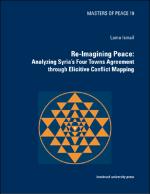Re-Imagining Peace
Analyzing Syria’s Four Towns Agreement through Elicitive Conflict Mapping
Author(s)
Ismail, Lama
Collection
AG UniversitätsverlageLanguage
EnglishAbstract
In March 2017 during the armed conflict in Syria, the “Four Towns Agreement” was sealed as a reconciliation deal between the government and the armed opposition under the auspices of Iran and Qatar. Using the methodology of Elicitive Conflict Mapping, Lama Ismail makes use of the “Four Towns Agreement” as a conflict episode, i.e. a window to explore the agreement as an expression of the conflict as a whole, with large and wide implications depending on who is experiencing it. Beyond the prevalent discourses of justice and security, this research puts different viewpoints and discourses into conversation with each other. At the epicentre of the conflict, the analysis shows how visions of peace collide, layers of conflict extend beyond families and communities, and relational spaces between different groups of people are made visible. The analysis of the “Four Towns Agreement” reveals the complex conflictive landscape in Syria and the many ways it can be understood. In recognizing this, what kind of world emerges from the point of view of many rather than one? This book is a timely contribution to the reading of the Syrian conflict for students, researchers and professionals interested in the region, as well as those conversant with the fields of international relations, sociology, philosophy, history, international law and peace and conflict studies.; Während des bewaffneten Konflikts in Syrien im März 2017 wurde das „Vier-Städte-Abkommen“ als ein Versöhnungsabkommen zwischen der Regierung und der bewaffneten Opposition unter der Schirmherrschaft von Iran und Katar besiegelt. Lama Ismail verwendet die Methode der Elicitive Conflict Mapping und nutzt das „Four Towns Agreement“ als Konfliktepisode, d. h. als Fenster, um das Abkommen als Ausdruck des gesamten Konflikts zu untersuchen, mit großen und weitreichenden Auswirkungen. Über die vorherrschenden Diskurse von Gerechtigkeit und Sicherheit hinaus werden bei dieser Untersuchung unterschiedliche Standpunkte und Diskurse miteinander ins Gespräch gebracht. Im Epizentrum des Konflikts zeigt die Analyse, wie Friedensvisionen kollidieren, Konfliktschichten jenseits von Familien und Gemeinschaften entstehen und Beziehungsräume zwischen verschiedenen Personengruppen sichtbar gemacht werden. Die Analyse des „Vier-Städte-Abkommens“ zeigt die komplexe Konfliktlandschaft in Syrien und die vielen Arten, wie sie verstanden werden kann. Welche Art von Welt entsteht aus der Sicht vieler statt einer? Dieses Buch ist ein zeitgemäßer Beitrag zur Lektüre des Syrienkonflikts für Studenten, WissenschaftlerInnen und Fachleute, die an der Region interessiert sind, sowie für diejenigen, die mit den Bereichen internationale Beziehungen, Soziologie, Philosophie, Geschichte, Völkerrecht und Friedens- und Konfliktforschung vertraut sind.
Keywords
Peace and Conflict studies; Syria; Friedens- und Konfliktforschung; SyrienPublisher
innsbruck university pressPublisher website
https://www.uibk.ac.at/iupPublication date and place
Innsbruck, 2019Series
Masters of Peace, 19Classification
Peace studies and conflict resolution


 Download
Download Web Shop
Web Shop